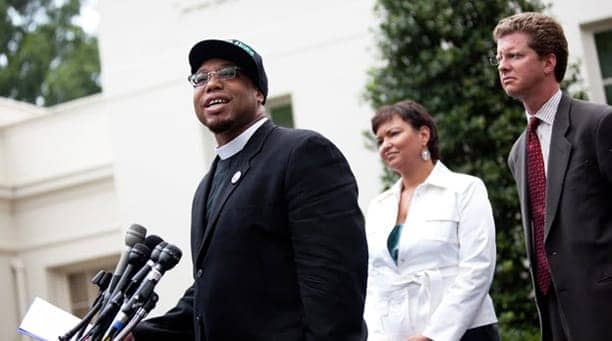 Washington – Members of President Obama’s Green Cabinet and the community engagement campaign, Green the Block, met in Washington today, Aug. 4, to discuss ways to ensure that opportunities from the new green economy are available to a broad cross section of the American people. In response to the president’s call to service through the United We Serve campaign, Green the Block also presented a birthday gift to President Obama in the form of a call to action for green community service projects in underserved communities on Sept. 11, the National Day of Service and Remembrance.
Washington – Members of President Obama’s Green Cabinet and the community engagement campaign, Green the Block, met in Washington today, Aug. 4, to discuss ways to ensure that opportunities from the new green economy are available to a broad cross section of the American people. In response to the president’s call to service through the United We Serve campaign, Green the Block also presented a birthday gift to President Obama in the form of a call to action for green community service projects in underserved communities on Sept. 11, the National Day of Service and Remembrance.
Participants in today’s event included Secretary Shaun Donovan, Department of Housing and Urban Development; Administrator Lisa P. Jackson, Environmental Protection Agency; and Under Secretary Kristina Johnson, Department of Energy. They were joined by Rev. Lennox Yearwood Jr., president of the Hip Hop Caucus; Phaedra Ellis-Lamkins, CEO of Green For All; and leaders of Green the Block.
Administrator Jackson, who grew up in New Orleans’ 9th Ward, understands the environmental challenges faced by individuals and families in vulnerable communities across the country.
“Poison in the ground means poison in the economy. A weak environment means a weak consumer base. And unhealthy air means an unhealthy atmosphere for investments,” Jackson said. “In case after case, the things that make good environmental sense also make good economic sense. When we put that environmental green on the block, we also put a lot more of that economic green on the block.”
Secretary Donovan discussed efforts by HUD to weatherize multi-family housing across the country and keep those jobs in impacted communities.
“The transition to clean energy and the benefits from it should extend to every corner of the country and penetrate communities that have long been passed over whenever waves of economic innovation are developing,” Donovan said. “This effort to advance information and resources to these communities now is a big step towards ensuring that the emerging green economy provides not simply a job, but a chance to build a business or invest in the next great idea in the industry.”
“‘Poison in the ground means poison in the economy. … When we put that environmental green on the block, we also put a lot more of that economic green on the block.’ – EPA Administrator Lisa Jackson”
The Department of Energy is also making significant investments with more than $8 billion for weatherization projects in local communities and incentivizing the use of clean energy. This work involves installing new energy efficient windows and doors, updating insulation, and encouraging state and local governments to use more fuel efficient vehicles and renewable forms of energy.
 “Cleaner communities are more livable communities,” Under Secretary Johnson noted. “This is a chance for us to significantly change course in our use of energy and lift up the economic fortunes of individuals and families.”
“Cleaner communities are more livable communities,” Under Secretary Johnson noted. “This is a chance for us to significantly change course in our use of energy and lift up the economic fortunes of individuals and families.”
Convened by Green For All and the Hip Hop Caucus, Green the Block is a new campaign to more deeply engage our most vulnerable communities in the transition to a 21st-century economy. Green the Block will encourage education, legislative advocacy, private-sector development and youth activism, and is supported by a broad-base coalition of partners.
“Green the Block is a movement to build a clean-energy economy where everyone has a chance to succeed,” said Ellis-Lamkins. “That starts with making sure that those who are often left out and left behind – low-income people and communities of color – have a voice and a presence in this movement. These communities also need a fair share of the economic, social and environmental benefits this transition is creating.”
Traditionally underserved areas are often hardest hit by environmental hazards and inefficiencies, including industrial brownfields, ground contamination and structural deficiencies. In the coming months as these areas are cleaned up and we move more towards a clean-energy economy, Green the Block will launch an effort to educate traditionally underserved communities about the opportunities available to individuals in the emerging green economy through job training, entrepreneurship and increased energy efficiency through infrastructure development.
According to Rev. Yearwood, this transition from fossil fuels to clean energy is rich with opportunities for all Americans, and everyone should have a chance to participate.

This story was issued as a press release by the White House Media Affairs Office. To learn more, visit GreentheBlock.net and WhiteHouse.gov.




